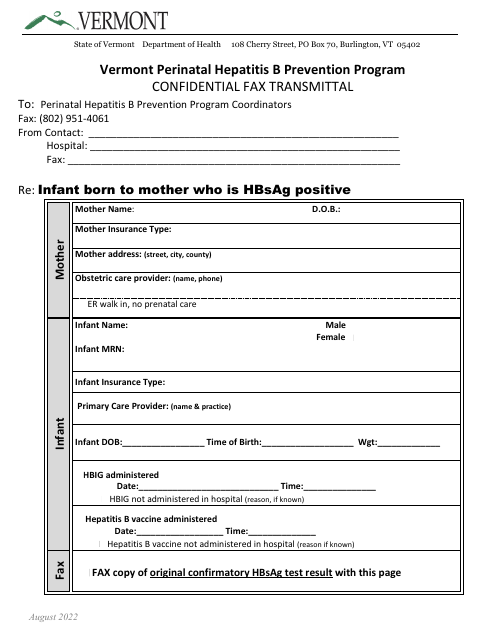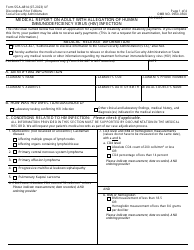Confidential Fax Transmittal - Vermont Perinatal Hepatitis B Prevention Program - Vermont
Confidential Fax Transmittal - Vermont Perinatal Hepatitis B Prevention Program is a legal document that was released by the Vermont Department of Health - a government authority operating within Vermont.
FAQ
Q: What is the Vermont Perinatal Hepatitis B Prevention Program?
A: The Vermont Perinatal Hepatitis B Prevention Program is a program that aims to prevent the transmission of hepatitis B from mother to baby.
Q: What is a confidential fax transmittal?
A: A confidential fax transmittal is a method of sending sensitive or confidential information via fax in a secure manner.
Q: Why is the Vermont Perinatal Hepatitis B Prevention Program using a confidential fax transmittal?
A: The Vermont Perinatal Hepatitis B Prevention Program is using a confidential fax transmittal to ensure the privacy and security of the information being sent.
Q: What kind of information is being transmitted via the confidential fax?
A: The confidential fax is being used to transmit information related to the perinatal hepatitis B prevention program in Vermont.
Q: Is the confidential fax transmittal only for healthcare professionals?
A: No, the confidential fax transmittal can be used by healthcare professionals as well as other authorized individuals involved in the program.
Q: Is the use of a confidential fax transmittal mandatory?
A: Yes, the use of a confidential fax transmittal is mandatory for transmitting information related to the Vermont Perinatal Hepatitis B Prevention Program.
Q: Can I participate in the Vermont Perinatal Hepatitis B Prevention Program?
A: If you are a healthcare professional or an authorized individual involved in perinatal hepatitis B prevention in Vermont, you may be eligible to participate in the program. Contact the program directly for more information.
Q: Is the Vermont Perinatal Hepatitis B Prevention Program available in other states?
A: The Vermont Perinatal Hepatitis B Prevention Program is specific to Vermont. However, other states may have similar programs in place to prevent perinatal transmission of hepatitis B.
Q: Why is it important to prevent perinatal transmission of hepatitis B?
A: Preventing perinatal transmission of hepatitis B is important because it can significantly reduce the risk of chronic liver disease, liver cancer, and other complications associated with hepatitis B infection.
Q: What should I do if I suspect that I or someone I know has been exposed to hepatitis B?
A: If you suspect that you or someone you know has been exposed to hepatitis B, it is important to seek medical advice. Testing and appropriate medical management can help prevent further transmission and complications.
Q: Are there vaccines available to prevent hepatitis B?
A: Yes, there are vaccines available to prevent hepatitis B. It is recommended to get vaccinated against hepatitis B as part of routine immunization.
Q: Can hepatitis B be cured?
A: While there is no cure for hepatitis B, it can be managed with medical treatment. It is important to consult a healthcare professional for proper diagnosis and management.
Q: Are there any support services available for individuals affected by hepatitis B?
A: Yes, there are support services available for individuals affected by hepatitis B. Local healthcare providers or organizations may offer counseling and support groups for individuals living with hepatitis B.
Q: How can I protect myself from hepatitis B?
A: To protect yourself from hepatitis B, it is recommended to get vaccinated, practice safe sex, avoid sharing needles, and take precautions against contact with blood or other bodily fluids.
Q: Is there a risk of contracting hepatitis B through casual contact?
A: The risk of contracting hepatitis B through casual contact (such as hugging, sharing utensils, or using the same bathroom) is very low. Hepatitis B is primarily spread through blood, sexual contact, and sharing of needles.
Q: Is hepatitis B a common disease in the United States?
A: In the United States, the prevalence of hepatitis B has significantly decreased due to vaccination programs. However, it is still important to prevent transmission and raise awareness about the disease.
Q: What are the symptoms of acute hepatitis B?
A: Symptoms of acute hepatitis B may include fatigue, jaundice (yellowing of the skin and eyes), dark urine, abdominal pain, loss of appetite, and nausea.
Q: Can a pregnant woman with hepatitis B breastfeed her baby?
A: In most cases, a pregnant woman with hepatitis B can breastfeed her baby if appropriate precautions are taken, such as making sure the baby receives the necessary vaccinations.
Q: What should I do if I have more questions about hepatitis B?
A: If you have more questions about hepatitis B, it is recommended to consult a healthcare professional or contact a local health department for accurate and up-to-date information.
Form Details:
- Released on August 1, 2022;
- The latest edition currently provided by the Vermont Department of Health;
- Ready to use and print;
- Easy to customize;
- Compatible with most PDF-viewing applications;
- Fill out the form in our online filing application.
Download a fillable version of the form by clicking the link below or browse more documents and templates provided by the Vermont Department of Health.






